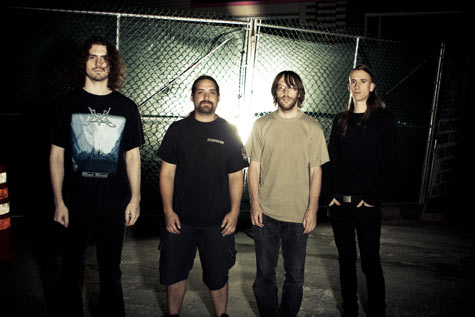
PURE EVIL “We’re trying to pull all of the awesome musical moments you hear on a black-metal CD and have it be that way all the time,” says Nick McMaster (left).
|
“I’d like you to clarify a bit more exactly what you mean by ‘go off the rails.’ ” I’m speaking to Nick McMaster, bassist for Krallice — I hesitate to say “interviewing,” because moments like this, where he’s asking me for clarification, make it hard to say who is the interviewer and who is the subject. I’m trying to get a sense of where his band are coming from when they compose their music: dense and sprawling splatterworks that are confined within a metal subgenre and yet boundlessly unfettered. What I discover is that, within the world of the New York–based Krallice (who come to Great Scott's this Tuesday), a rigorously self-enforced orthodoxy coupled with some serious overthinking can result in some of the most emotionally cathartic and wildly insane music ever made.
Unlike other genres, metal hasn’t evolved so much as it’s been refined, with bands taking the awesome parts of a prior generation’s metal, excising the lame parts, and distilling an ever higher potency to pour down the throats of the next wave of metal fans. “There’s never a punk moment; no ‘Fuck all that shit, we’re going to do something new,’ ” says McMaster. “That doesn’t happen in metal, and it’s what gives it great continuity.” For Krallice, this continuity has meant tackling the foreboding subsect of black metal — a realm of Satanism, murder, and ridiculous facepaint. “We’re trying to be respectful in the musical sense. We’re not trying to be one of those bands that says, ‘Metal is stupid,’ but at the same time, we’re not into dressing up. We’re trying to pull all of the awesome musical moments you hear on a black-metal CD and have it be that way all the time.”
A listen to their latest, 2009’s Dimensional Bleedthrough (Profound Lore), bears this vision out: cascading sheets of guitar meet blood-curdling screams and monstrously busy drumming in a series of never-ending terrorscapes. Although the band see their music in terms of how it fits into a larger metal universe, Krallice are as easily appreciated from a non-metal perspective, with their interlocking and repeating motifs conjuring minimalist composers like Steve Reich and Rhys Chatham rather than, say, Slayer.
“To my ears,” McMaster explains, “the single most salient aspect of our sound is the polyphony in the riffs.” Polyphony is the concept of two or more independent melodic voices, as opposed to there being just a single dominant one. Polyphony of the contrapuntal variety is what you hear in Bach, but in the hands of guitarists Mick Barr and Colin Marston, it allows Krallice to emit punishing sound valleys without resorting to the usual twin unison riffage that typifies metal guitar. To a non-metal-head, the result is not unlike, say, Sonic Youth gone metal — a comparison that I’m sure would make the band squirm.